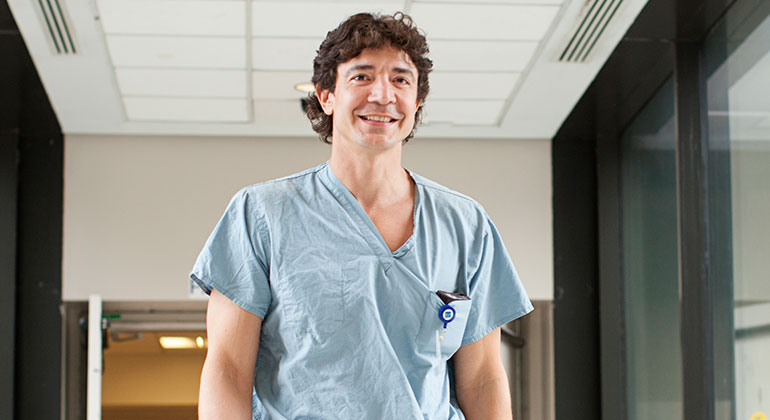Mount Sinai Achieves Highest Rating From Society of Thoracic Surgeons for Ground-Breaking Esophagectomy Program

The Mount Sinai Health System’s esophagectomy program has received a three-star (excellent performance) overall composite score from the Society of Thoracic Surgeons (STS).
According to STS, only 13 institutions in the United States and Canada hold the three-star rating, which denotes the highest category of quality, for esophagectomy surgery. The esophagectomy overall performance score represents two domain scores in a single number: absence of both operative mortality and major morbidity.
Esophagectomy is the main surgical treatment for esophageal cancer. Mount Sinai’s esophagectomies incorporate a surgical innovation by Raja Flores, MD, Chair of Thoracic Surgery at the Mount Sinai Health System, who pioneered a simple yet highly effective change in the surgical approach.
“I’m surprised and honored at the recognition our department has received from the STS,” Dr. Flores said. “Surprised because it has been my hope that surgeons at other institutions would adopt our modification, which simply involves switching the juncture site between the stomach and the esophagus to promote better blood flow between the two organs.” Dr. Flores described the revision in an article in the Journal of Surgical Oncology and created a video to demonstrate the technique.
The revised procedure is less invasive than conventional esophagectomy, causes less trauma, and reduces complications such as leaking or obstruction. It also decreases the average surgical time from seven to 2.5 hours, according to the journal article.
Many esophageal cancer patients have suffered for years from heartburn and acid reflux, and deal with the symptoms by taking antacids, Dr. Flores noted. Lou Martinez, an overnight custodian for the New York court system, was among them. One night several years ago, Mr. Martinez was having dinner at work and found that the food wouldn’t go down; it stuck in his throat. Even water just sat there.
“We diagnosed him with esophageal cancer, and like many other patients, he was shocked that a common symptom like heartburn could lead to a serious condition like cancer,” Dr. Flores recalled. Mr. Martinez, one of approximately 19,000 patients diagnosed with esophageal cancer annually in the United States, underwent the revised esophagectomy several years ago and continues to do well.
What drew Dr. Flores to thoracic surgery? “Actually, thoracic surgery chose me,” he said. “I didn’t know anything about the field until I was a fourth-year surgery resident in the ‘90s. I started seeing some patients who were a little rough around the edges, who suffered from self-inflicted exposures like alcohol addiction or smoking. I treated them at a time when esophagectomy was a dreaded procedure, when patients would have complications right and left. As I treated them, I realized I really love this field.”
Incremental changes have made esophagectomy much safer and more effective since then, and Dr. Flores hopes his approach will continue to move the field forward. “It’s not about whether you use a robot or laser or some other tool,” he said. “Focusing on the fine points of an operation is what actually gets rid of the cancer and helps ensure that the patient will recover without a complication.”
The STS star rating system is one of the most sophisticated and highly regarded overall measures of quality in health care, rating the benchmarked outcomes of cardiothoracic surgery programs in the United States and Canada. The General Thoracic Surgery Database (GTSD) star ratings are derived by testing whether the participant's composite or domain score is significantly different from the overall STS average for esophagectomy for esophageal cancer performed by GTSD participants.
STS General Thoracic Surgery Public Reporting offers a comparison of GTSD and national outcomes, demonstrating the high performance of GTSD participants. The latest analysis of data for esophageal cancer resection covers a three-year period, from July 1, 2019, to June 30, 2022, and includes 101 participants.
About the Mount Sinai Health System
Mount Sinai Health System is one of the largest academic medical systems in the New York metro area, employing 48,000 people across its hospitals and more than 400 outpatient practices, as well as more than 600 research and clinical labs, a school of nursing, and a leading school of medicine and graduate education. Mount Sinai advances health for all people, everywhere, by taking on the most complex health care challenges of our time—discovering and applying new scientific learning and knowledge; developing safer, more effective treatments; educating the next generation of medical leaders and innovators; and supporting local communities by delivering high-quality care to all who need it.
Through the integration of its hospitals, labs, and schools, Mount Sinai offers comprehensive health care solutions from birth through geriatrics, leveraging innovative approaches such as artificial intelligence and informatics while keeping patients’ medical and emotional needs at the center of all treatment. The Health System includes approximately 9,000 primary and specialty care physicians and 11 free-standing joint-venture centers throughout the five boroughs of New York City, Westchester, Long Island, and Florida. Hospitals within the System are consistently ranked by Newsweek’s® “The World’s Best Smart Hospitals, Best in State Hospitals, World Best Hospitals and Best Specialty Hospitals” and by U.S. News & World Report's® “Best Hospitals” and “Best Children’s Hospitals.” The Mount Sinai Hospital is on the U.S. News & World Report® “Best Hospitals” Honor Roll for 2024-2025.
For more information, visit https://www.mountsinai.org or find Mount Sinai on Facebook, Twitter and YouTube.

Lung Cancer Death Decline Associated With Screening, Earlier Diagnosis, and Surgery
Dec 17, 2021 View All Press Releases
